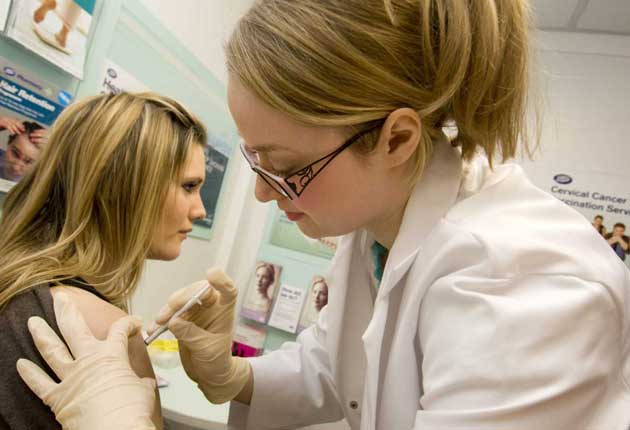HPV vaccine: Boys to be offered jab for first time in bid to cut cancer rates
Girls had been given the vaccine to combat cervical cancer, but Public Health England says jab can protect against other diseases
Boys in the UK will be given the human papilloma virus (HPV) vaccine from September in a bid to prevent several different forms of cancer, the government has announced.
Until now, only girls have been given the vaccine, which protects against cervical cancer as well as penile, anal and genital cancers – and some cancers of the head and neck.
From the start of the next school year, boys who are aged 12 and 13 will be given the jab in school with parental consent.
Boys will need two doses of the jab for full protection: the first dose will be given in Year 8, with a follow-up dose six months to two years later, also given in school.
It is hoped giving boys the vaccine will also give girls greater protection from HPV, which is passed on through sexual contact.
Estimates from the University of Warwick suggest the HPV vaccine will prevent more than 64,000 cervical cancers and almost 50,000 non-cervical cancers in the UK by 2058.
This will include more than 3,400 cases of penile cancer and more than 21,000 cases of head and neck cancer, such as throat cancer, in men.
Girls in Year 8 have been offered the HPV vaccine free in school since 2008. More than 3,000 women in the UK are newly diagnosed with cervical cancer each year, and the disease kills over 850 women annually.
Public health minister Seema Kennedy said: “The success of the HPV vaccine programme for girls is clear and by extending it to boys we will go a step further to help us prevent more cases of HPV-related cancer every year.
“Through our world-leading vaccination programme, we have already saved millions of lives and prevented countless cases of terrible diseases. Experts predict that we could be on our way toward eliminating cervical cancer for good.”

Dr Mary Ramsay, head of immunisation at Public Health England (PHE), said: “Offering the vaccine to boys will not only protect them but will also prevent more cases of HPV-related cancers in girls and reduce the overall burden of these cancers in both men and women in the future.
“I encourage all parents of eligible boys and girls to make sure they take up the offer for this potentially life-saving vaccine,” she added. “It’s important not to delay vaccination, as the vaccine may be less effective as adolescents get older.”
Figures out in December showed 83.8 per cent of girls completed the two-dose HPV vaccination course in 2017/18, compared with 83.1 per cent in 2016/17 and 85.1 per cent in 2015/16.

PHE said the programme meant infections of some strains of HPV in youngsters aged 16 to 21 have fallen by 86 per cent in England. A Scottish study also suggested the vaccine had reduced pre-cancerous cervical disease in women by up to 71 per cent.
Professor Helen Stokes-Lampard, chairwoman of the Royal College of GPs, said: “The potential of this vaccine to save lives and prevent the complications of cancer is huge, and since it has been available on the NHS for girls, it has had excellent take-up, with impressive results – it’s important this success is replicated with boys.”
Peter Baker, campaign director for HPV Action, also welcomed the news: “We made the case for this for five long years because we know that universal vaccination will save men’s and women’s lives, reduce suffering and in the long run save money too.”
The British Dental Association (BDA) warned parents to ignore “fake news” from any anti-vaccine groups suggesting injury caused by the vaccine.
It said social media “is awash” with content falsely linking the vaccine to a number of conditions. BDA chairman Mick Armstrong said: “A universal HPV programme will offer protection to all children from life-changing conditions like throat cancer.”
Additional reporting by PA
Join our commenting forum
Join thought-provoking conversations, follow other Independent readers and see their replies
Comments
Bookmark popover
Removed from bookmarks